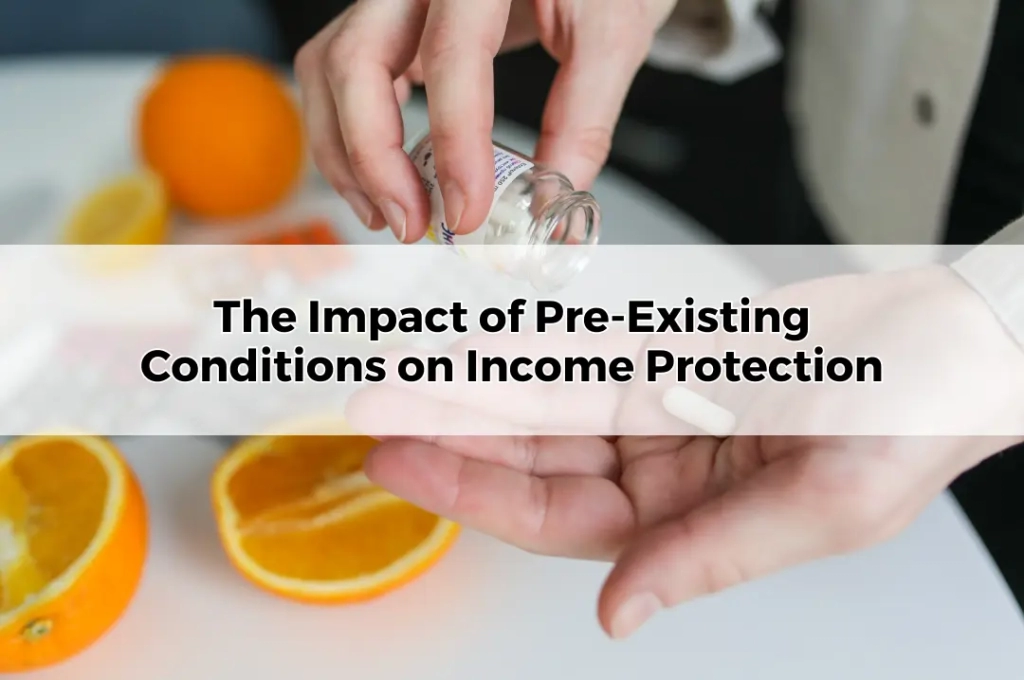The Impact of Pre-Existing Conditions on Income Protection
Table of Contents
ToggleUnderstanding Income Protection Insurance
Income protection insurance serves as a financial safety net, providing a regular income if you’re unable to work due to illness or injury. This type of insurance is especially crucial for those who rely on their salary to meet daily living expenses and financial commitments. By replacing a portion of your income, it ensures that you can maintain your lifestyle even when unforeseen circumstances disrupt your ability to earn.
What Qualifies as a Pre-Existing Condition?
A pre-existing condition refers to any medical condition that existed before the start of an insurance policy. This can include chronic diseases like diabetes, conditions like high blood pressure, mental health disorders, or even past injuries. Insurers consider these conditions carefully as they assess the risk associated with providing coverage.
How Insurers Assess Risk
The application process for income protection insurance involves a thorough assessment of your health and medical history. Insurers require detailed information about your health, including any pre-existing conditions, treatments, and medications. This information helps them gauge the likelihood of a claim being made and to what extent they are willing to provide coverage.
The Role of Underwriters
Underwriters are the gatekeepers of the insurance world. Their role is to evaluate the risk posed by an applicant and decide on the terms of the policy. They analyse medical records, lifestyle factors, and occupational hazards to determine the level of risk. Based on their assessment, they may accept the application, impose exclusions, or adjust the premium.
How Pre-Existing Conditions Affect Costs
Premiums for income protection insurance can be significantly influenced by pre-existing conditions. High-risk conditions may lead to higher premiums as insurers account for the increased likelihood of a claim. Each condition is evaluated on its severity, how well it is managed, and the overall health of the applicant.
Common Exclusions and Their Implications
Policies often include exclusions for pre-existing conditions, meaning that any claims related to these conditions will not be covered. For example, if you have a history of back problems, the insurer might exclude coverage for any back-related issues. Understanding these exclusions is essential to avoid unexpected surprises when making a claim.
The Necessity of Transparency
Full disclosure of all medical conditions and treatments is crucial when applying for income protection insurance. Non-disclosure or misrepresentation of information can result in denied claims or even cancellation of the policy. Being transparent ensures that the coverage you receive is reliable and that you avoid complications during claim processing.
Managing Health and Lifestyle
Improving insurability involves proactive health management. Regular check-ups, following prescribed treatments, maintaining a healthy lifestyle, and managing stress can positively influence your health profile. Demonstrating good health practices can lead to better terms and potentially lower premiums.
How Past Health Issues Influence Decisions
Your medical history plays a significant role in the underwriting process. Insurers look at past health issues to predict future risks. Conditions that have been resolved or are well-managed may have a lesser impact on your insurance terms compared to ongoing or poorly managed conditions.
Australian Laws and Regulations
The income protection insurance sector in Australia is governed by laws and regulations designed to protect consumers. The Insurance Contracts Act 1984 ensures fair treatment of applicants and policyholders. Staying informed about these regulations helps you understand your rights and the obligations of insurers.
The Benefits of Financial Advisers
Seeking advice from financial advisers can be invaluable when navigating the complexities of income protection insurance. Advisers can help you understand policy terms, compare different insurers, and ensure that your application accurately reflects your health status. Their expertise can make a significant difference in securing the best possible coverage.
Finding the Best Policy for Your Needs
Comparing insurance providers is essential to finding the right policy. Different insurers have varying criteria for assessing pre-existing conditions and setting premiums. By shopping around and comparing options, you can find a policy that offers the best balance of coverage and cost.
Navigating Income Protection with Confidence
Understanding the impact of pre-existing conditions on income protection insurance is crucial for making informed decisions. By being transparent, managing your health, seeking professional advice, and staying informed about regulations, you can navigate the insurance landscape with confidence. This proactive approach ensures that you have a robust safety net to protect your income and financial stability in the face of illness or injury.



